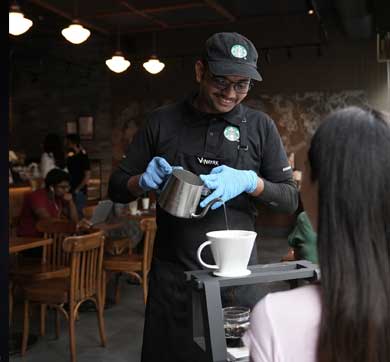August 2024 | 3227 words | 12-minute read
Amid global economic uncertainty, Tata Consumer Products (TCP) has emerged as a resilient player in India’s dynamic and burgeoning consumer market. Through a judicious mix of strategic organic expansions into adjacent categories and acquisitions, TCP has significantly expanded its total addressable market.
Its portfolio today stretches far beyond its traditional tea and salt domains into high-growth areas such as packaged foods, premium nutrition, value-added hydration solutions, and convenience products. Despite operating in a challenging environment, TCP’s focus on consolidation, innovation, premiumisation and operational efficiencies have helped it grow faster than the industry. It has posted a revenue of Rs 15,206 crore in FY24 — up 60% from Rs 9,637 crore in FY20 — with its market cap crossing the Rs 1 lakh crore milestone during the year. Its success story, woven with threads of sustainability and social responsibility, is a compelling narrative of conscious capitalism in action.
Growth story
“We started with the aim of becoming India’s premier FMCG company,” says Sunil D’Souza, Managing Director and Chief Executive Officer, TCP. “The food and beverage segments have a larger playing field, and since they were already part of our DNA, it was easier for us to work on building out that piece.”
Formed amidst global turmoil in 2020, through a merger of Tata Global Beverages and Tata Chemicals’ consumer division, TCP has aggressively diversified its portfolio. It now plays in numerous categories like pulses, spices, pantry staples, ready-to-drink (RTD), preserves, dry fruits, ready-to-cook (RTC), ready-to-eat (RTE), herbal supplements, cooking aids, like sauces, snacks, and breakfast cereals, amongst others, in an effort to capture more of the consumer’s basket.

Resilience and momentum
Over the last four years, the company’s top line has also expanded at a robust double-digit pace, delivering a compounded annual growth rate (CAGR) of 12%, with an earnings CAGR of 27%. Strategic acquisitions, like Soulfull in 2021 and Organic India and Capital Foods in 2024, have further underscored its ambition to be a holistic FMCG powerhouse.
In the last fiscal year, TCP continued focusing on its core themes of simplification, synergy and scale to drive business transformation across its geographies, which today include India, the US, the UK, Europe, Canada, Australia, the Middle East, and Africa. The 3S strategy, outlined by N Chandrasekaran, Chairman, Tata Sons, has helped the company strengthen its market position, enhance operational agility, unlock efficiencies, build future-ready capabilities and have given it a competitive edge.

“FY 2023-24 has been a milestone year for Tata Consumer Products in many aspects,” says Mr Chandrasekaran. “The highlight this year is the superior bottom-line growth led by improved profitability and margins across businesses. In the four years since the formation of the company, the revenue and net profit before exceptional items have seen a 12% and 21% CAGR, respectively. This is amongst the best in the industry and continues to improve. Looking ahead to FY 2024-25 and beyond, I am bullish about our prospects and confident in our ability to navigate the evolving landscape successfully.”
The growth during the year was broad-based with the India business delivering a strong performance with an overall revenue of Rs 9,736 crore — up 12% — led by an 18% increase in the India foods business and a 7% increase in the India beverages business.
The current core business (tea, coffee, salt) grew at 6%, while growth businesses were up 47%, aided by the acquisition of Capital Foods. Within the growth businesses, NourishCo (Himalayan, Tata Gluco+, Tata Copper among others) delivered 33% growth in revenue — 4.6X from FY20. Tata Sampann had another strong year, growing 45%, while Tata Soulfull has seen a 4X increase in revenues since the acquisition.
Starbucks, the company’s JV in the out-of-home business, has seen rapid expansion. FY24 saw the launch of 95 new stores — the highest number since inception — and entry into 20 new cities. TCP aims to increase this to 1,000 stores by 2028, equivalent to a new store opening every three days.

Global footprint
TCP has also made significant strides in growing its consumer business globally — Tetley is the No 2 branded tea player globally. In FY24, the international business grew by 9% to Rs 3,925 crore, and accounted for 26% of the revenue. It has continued to build on its market leadership, retaining its No 1 position in the Canadian tea market, and was the No 3 tea brand in the competitive UK market, delivering a 10% increase in revenue (constant currency terms). In the US, Tetley ranked No 2 in the packaged black hot tea market, while the South Africa tea business delivered strong growth, with revenues up by 22%.
The company has also launched products beyond its beverages portfolio. It rolled out Tata Raasa and Tata Sampann in Canada, the US, Australia, the UK, and Europe, marking its entry into the Indian ready foods segment. Last year, it launched millet-based cereals in the US and the UK, under the brand name Joyfull. Going ahead, the company plans to further flex its distribution muscle, capitalising on Organic India and Capital Foods’ strong product portfolios to take more brands overseas.

Innovation-powered growth
Innovation has been a key growth engine for TCP and the company has introduced a steady stream of 100+ products in the last four years — with 47 launched in FY24 — catering to evolving consumer preferences, from healthy snacks to premium tea offerings. Its commitment to R&D (it spent Rs 34.98 crore in FY24) and consumer insights has helped it tap into market trends and expand its footprint. This culture of innovation has been central to TCP’s success, reflected in the 5X growth in innovation revenues over the last three years. Significantly, innovation contributed to 20% of NourishCo’s FY24 sales, while it was 12.5% for Soulfull.
“When we started, we were significantly behind on innovation,” says Mr D’Souza. “We are now at a 5.1% ratio to sales, which is best-in-class. We did this by creating the right R&D structure and investing for the future with a focus on key consumer trends, convenience and premiumisation.”
The company identified consumer gaps or pain points, and embedded people in the marketing teams to find solutions and drive innovation. “We also ensured that we had the right capabilities in the R&D team to translate those ideas into actual products that we could take to market,” says Mr D’Souza. “Tata Soulfull Ragi Bites Choco Sticks is one such example. The idea was to craft a healthier chocolate snack with ragi. The challenge lay in binding the stick without maida. But the team finally cracked it. Our product has zero maida and 30% less sugar, so we have tackled the gatekeeper who buys the product, ie the mom, and kids love it because the taste profile is the same. Another interesting one is the hassle-free, easy-to-cook dal that the team is perfecting. You just place the pulses in a bowl with some water and heat in a microwave to get dal.”
TCP’s innovation momentum resulted in 47 new launches in FY24 — nearly one launch every seven days — and it is targeting 50 new launches in FY25.


Meeting evolving customer needs
The Indian foods and beverages market is estimated to grow at an annualised rate of 10-15% over the next five years, driven by a young population, urbanisation, affluence, aspiration, and improved access to branded products. Picking up on these evolving consumer preferences, TCP has made a strategic pivot towards premiumisation and convenience across its portfolio. The dual strategy taps into the limited penetration of branded products in many categories. By elevating its brands like Tata Tea, Tata Salt, and Tata Sampann, the company is targeting the new cohort of aspiring middle-class consumers who are willing to pay for quality, convenience and a premium experience. This move promises higher margins and TCP’s strategy to capitalise on these trends, including the acquisition of Capital Foods (owner of Ching’s Secret and Smith & Jones), is paying rich dividends.
“While we are seeing continued high growth across our portfolio, the premium part of our portfolio is outpacing our overall growth,” says Mr D’Souza. Value-added salts grew 34% in FY24, accounting for 9% of the India salt business, and premium/mass-premium brands in the packaged beverages space contributed two-thirds to overall revenue.

New products, such as Himalayan’s Saffron and Preserves, Tata Sampann’s expanding dry fruits range, and launches under Tata Tea 1868 and Tata Coffee Sonnets cater to these evolving customer preferences.
“There is a rising trend of consumers adopting cooking aids for quick meal preparation and we are strengthening our offerings in categories such as sauces, ready-to-cook meals, spices, and other cooking aids,” says Mr D’Souza. “The Capital Foods portfolio is well-positioned to leverage the convenience trend with their cooking aids product range, which will help strengthen our pantry platform. Whether it is the Smith & Jones Ginger Garlic Paste or Ching’s Schezwan Chutney, it is all about convenience, and we will further expand the ranges.”
Tech integration for sales
Along with tackling the uphill task of consolidating the business, TCP has also strongly focused on building a robust sales and distribution infrastructure and has expanded its presence to reach 263 million Indian households in FY24.
The company realised early on that digital transformation was crucial for it to navigate the complexities of the Indian market, from urban e-commerce to rural last-mile delivery. It has deployed advanced analytics and artificial intelligence (AI) to deepen consumer insights and develop targeted media campaigns and aggressive distribution strategies. “In fact, we used AI for the entire Himalayan Saffron ad. Going forward, we are looking at using AI for forecasting as well as to enable accuracy,” says Mr D’Souza.

A matter of trust
The recent controversy on quality of spices exported from India has put FMCG players and their manufacturing processes in the spotlight. However, Mr D’Souza isn’t worried. “We do not use ethylene oxide precisely because we know of its effects,” he says. “We do steam sterilisation, which many companies do not opt for as it impacts the colour of the spices. We are a Tata company, and as long as we are living up to the Tata values and ensuring our products are made in line with these values, we will be okay.” However, TCP isn’t shying away from using this as an opportunity. “Irrespective of whether there is an impact on other brands or not, we have an opportunity to improve our distribution across all categories. The Tata brand name works wonders when there is a trust deficit. At times like this, the job just becomes easier.”
This tech-driven approach also extends to e-commerce, where TCP is leveraging algorithms for dynamic pricing and inventory management. It has invested in direct-to-consumer (D2C) platforms, not just for sales but as a rich data source for understanding evolving consumer preferences, reaching 2 lakh customers in FY24. “We continue to strengthen our e-commerce and modern trade presence and have recorded significant gains in alternate channels,” says Mr D’Souza. In FY24, e-commerce accounted for 11% of TCP’s India business, up from 3% in FY20. Its 35% growth in sales was led by the foods business — a 70% surge from the previous year — and its market leadership in tea, both of which rode high on value-added and premium variations.
As part of its strategy, TCP offers certain brands, like Tata Tea 1868, Tata GoFit, Tata Coffee Sonnets, and Tata Simply Better, only on digital channels, and has created specific packs to tap into the rising demand from quick commerce. “As a result, we have seen the share of quick commerce to our overall e-commerce channel rise disproportionately,” says Mr D’Souza. Quick commerce now accounts for ~30% of TCP’s India e-commerce revenue.

Boosting reach with tech
“There is also greater impetus on adoption of newer, scalable digital technologies to streamline operations for our sales and distribution network and enable agile business decisions,” says Mr D’Souza. In FY24, the company launched an AI-enabled, end-to-end commodity procurement platform, as well as a go-to-market SalesForce platform-based Distributor Management System to streamline operations for its network. “It allows us to run analytics at the back end to access real-time data, simplify processes, enable forecasting and test methodologies. Globally, we are the first ones to implement this in our general trade,” says Mr D’Souza.
Later this year, TCP will be launching another homegrown app, this time for its sales force. MAVIC is designed to be a one-stop transaction and analytics app. It leverages AI and machine learning (ML) technology to overcome scalability challenges, providing real-time price analysis and prediction for enhanced operational efficiency and sales performance.
In FY24, the company reached 4 million retail outlets, a 100% jump from 2020, of which 1.6 million are served directly. “We will now be focusing on enhancing semi-urban and rural distribution as our rural growth is fast catching up to our urban growth,” says Mr D’Souza. This echoes a larger industry trend. According to NielsenIQ data, volumes in rural areas increased by 7.6% in the March 2024 quarter, while urban volume growth was 5.7%.
Fast-tracking integration
Using its tried-and-tested integration playbook, TCP completed the integration of Capital Foods and Organic India within 100 days of closing the respective deals. “This is the target we have set for ourselves. In 100 days, everything in the acquired company should function like it’s a Tata company,” says Mr D’Souza. The company has a dedicated business integration team comprising subject matter experts from different domains, who plan, prepare and monitor the integration process to mitigate any risks.
Riding the wellness wave
TCP’s calculated tilt towards health and wellness, resonating with post-pandemic consumer trends, has further propelled its expansion. Of the 47 products launched in FY24, 16 fall in this category — these include Tata Tea Gold Vita Care, Tata Simply Better cold-pressed oils, Tata Salt Immuno, and Tata Salt Iron Health — and TCP is increasingly prioritising portfolio expansion through value-added products within its existing categories.
Its acquisition of Organic India in February 2024 was a big step in its strategy to broaden its market reach by venturing into complementary categories that promise both accelerated growth and superior profit margins. With its 100+ products — that have a target addressable market size of Rs 82,000 crore globally — strong international presence, and end-to-end organic supply chain, Organic India is poised to be a significant value creator for TCP.

“Organic India provides us with an opportunity to develop a health and wellness platform with a leading ‘better for you’ organic brand with a strong brand and supply chain,” says Mr D’Souza. “There is an exciting opportunity to significantly expand Organic India’s retail reach in India by not only leveraging TCP’s expansive outlet presence but also our strong relationship with large modern trade retailers and e-commerce.”
Exploring new opportunities
“While we are strong in salt and tea, these are not the fastest growing categories. So, we realised early on that we needed to get into new categories that would help us grow into India’s premier FMCG,” says Mr D’Souza. “We identified Tata Sampann, NourishCo and Tata Soulfull as our growth engines, and we have now added Organic India and Capital Foods to the list. These businesses together contribute about 30% of our India portfolio, and we aim to grow them at 30%. Tata SoulFull has already multiplied 4X since acquisition, while Tata Sampann has grown 3X over three years and NourishCo nearly 5X in four years.”
In FY24, TCP’s growth businesses, which include Tata Sampann, NourishCo, Tata Soulfull, and Tata SmartFoodz, recorded higher growth (40%) than the core businesses, accounting for 18% of the India business, up from 8% in FY21. NourishCo entered new categories with the launch of its Say Never! energy drink, Tata Gluco+ sports drink, and Himalayan Kashmiri Saffron, while Tata Soulfull launched several new products, including Ragi Bites Choco Sticks, Millet Granola, and Nutri Drink+, a cereal-based drink.
“This fiscal, we know Organic India will be at the forefront of our health and wellness offerings,” says Mr D’Souza. “Different businesses will see different levels of innovation. The ready-to-drink category will see double-digit innovations-to-sales ratio, because the beverage business operates that way. With Soulfull, we will concentrate on execution and adding new flavours in the breakfast category and add more snack options. We will also continue to stay ahead of the curve on the digital front, whether it is e-commerce, digital marketing or digital enablement within the organisation across functions.”

Building a future-ready team
The company has strengthened its focus on talent management, developing comprehensive learning and development programmes to nurture a strong leadership pipeline, enhance employee engagement and facilitate talent mobility. TCP’s focus is on helping unlock potential paid dividends, with 38% of vacant positions being filled by existing employees. “We have a robust talent identification and management programme to make sure we are building from the grassroots,” says Mr D’Souza. “Succession plans are already in place for two-thirds of the leadership roles.”
The integration of Tata Coffee into the parent company and the forthcoming merger of Tata Soulfull, NourishCo, and Tata SmartFoodz, as part of TCP’s 3S strategy, are also expected to unlock value and drive revenue through improved efficiencies. The company is looking to maximise export potential through cross synergies. About 40% of Organic India’s revenue is from the US, while ~17% of Capital Foods’ revenue is from exports. Combined with TCP’s relationships with large retailers across international markets, there is an opportunity to enhance brand presence and drive revenue in these markets.

Unlocking new channels
The acquisition of Organic India also provides an opportunity for the company to further develop its pharma channel. While TCP does have some brands, like Tata GoFit and Tata Soulfull, that are sold in pharma channels, the addition of Organic India’s strong product portfolio means it now has the brand power and scale to focus on building a comprehensive market penetration plan in this sector.
The company is also mulling over creating a separate distribution arm to directly cater to the hotel, restaurant, and café/catering (HORECA) sectors. Mr D’Souza sees this as a lucrative opportunity for the company to expand its distribution channels beyond general and modern trade outlets and cater to the B2B market through differentiated offerings.

“Health and wellness, convenience and digital are the top three trends dominating this industry. Whoever operates in multiples of these domains will create magic. If you have a health and wellness product, which can be consumed in a convenient format and is available online, you are in a very, very sweet spot.”—Sunil D’Souza, MD and CEO, Tata Consumer Products
Over the past four years, through its robust investments in R&D and digital technologies, supply chain overhaul and razor-sharp consumer focus, TCP has established a track record of consistent growth. What started as a consolidation of the Tata group’s beverages and foods business has rapidly transformed into a well-diversified FMCG powerhouse.
—Esther Cabral













